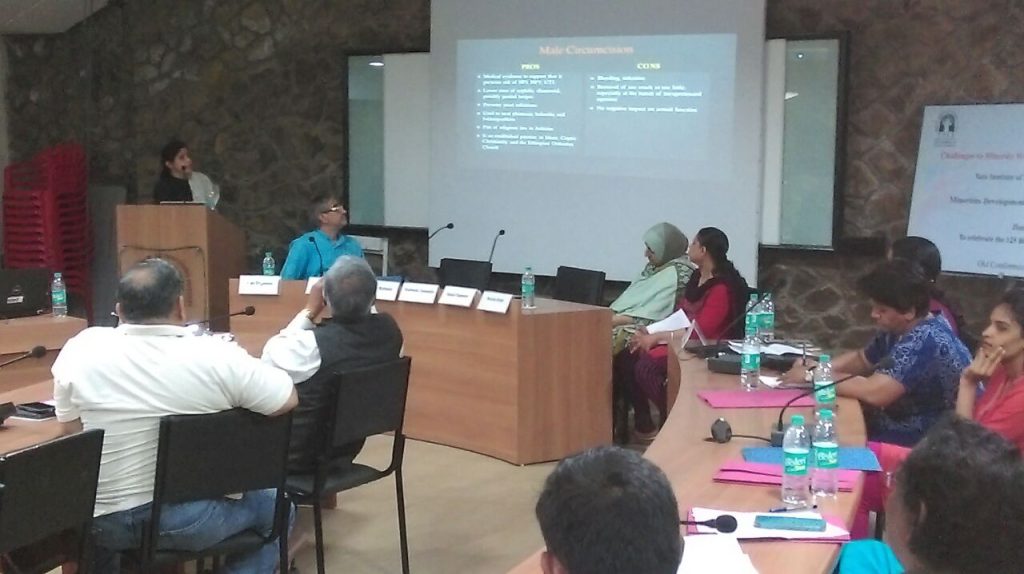ખત્ના કરાવવી કે નહીં? આપણી દીકરીઓને મોટી થવા દો અને જાતે નિર્ણય લેવા દો
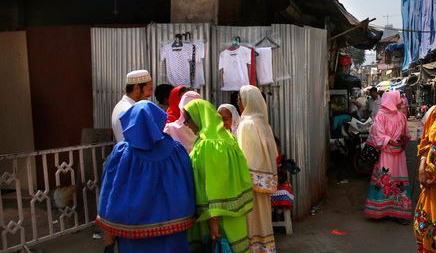
લેખિકા : ઈન્સિયા વય : ૩૪ વર્ષશહેર : મુંબઈ, ભારત હું એક જાણીતા અને સુશિક્ષિત પરિવારની સભ્ય હોવાથી મને હંમેશા કશુંક જુદું વિચારવાની તક મારા કુટુંબે આપી છે. અમારી કોમના નિયમોને ધ્યાનમાં લીધાં વિના, મારા માતાપિતા હંમેશા મને ટેકો આપતા આવ્યા છે. મને શિક્ષણ અપાયું હતું અને મારા ભાઈઓની જેવા સરખા અધિકારો અપાયા હતા. મારી વાતની કદી ઉપેક્ષા નહોતી કરાતી અને મારા અભિપ્રાયોને ધ્યાનમાં લેવાતા હતા. હું એક દીકરી હતી, પરંતુ મારી સાથે એક દીકરા જેવા વ્યવહાર કરાતો હતો. પણ અમારી કોમ સહેજ વધુ એકબીજાની સાથે નજીકથી સંકળાયેલી હોવાથી, મારે શું કરવું જોઈએ તે વિશે બોલવાનો દરેકને અધિકાર હતો. મારા પરિવારમાંની તમામ મહિલાઓ અમારા પર તેમના વિચારોને પ્રભાવ પાડી રહી હોવાથી, મારી વય જ્યારે સાત વર્ષની હતી ત્યારે મારી માતા સંમત થયાં હતાં કે મારે ખત્ના કરાવવી જોઈએ. એ દિવસ મને આજે હજી પણ સ્પષ્ટપણે યાદ છે. મારી ખત્ના કરાવવા માટે મારી માતા અને માસી પુણેમાં આ મહિલાના ઘરે લઈ ગયાં હતાં. કદાચ હવે દુ:ખાવો મને યાદ નહીં આવે, પરંતુ એ દિવસનો ભય, ઉદાસીનતા અને અવિશ્ર્વાસ હજી કાયમ છે. મારી અનેક પિત્રાઈ બહેનો હજી મને પૂછે છે, ‘‘જે કંઈ બન્યું તે વિશે તું શા માટે આટલી બધી વ્યથિત છે? શું તેથી આપણે કોઈ પણ રીતે બદલાયાં છીએ?’’ હું સંમત થાઉં છું કે ખત્નાથી સેક્સ (જાતીય સુખ) માણવા પ્રત્યેની મારી ઇચ્છા કદાચ નહીં બદલાઈ હોય, પરંતુ આપણી માતાઓ પ્રત્યેનો મારો દૃષ્ટિકોણ બદલાયો છે. જેઓ આપણને એવું જણાવે કે આપણને બળજબરીથી કોઈ સ્પર્શ કરે, ખાસ કરીને આપણાં ગુપ્તાંગોને સ્પર્શ કરે એ ખોટું છે, પરંતુ તો પછી તેઓ જાતે એક અજાણી મહિલાની પાસે શા માટે લઈ જાય છે? જે આપણી પેન્ટ ઉતારી પાડે છે અને આપણને સ્પર્શ કરે છે? આપણી માતાઓ અને માસીઓ-કાકીઓ કેમ એવું નથી વિચારતાં કે સાત વર્ષ એવી વય નથી કે જે વયે બાળકો તેમની સાથે શું કરાઈ રહ્યું છે, તેને સમજવા કે તેનો વિરોધ કરવા પૂરતા પ્રમાણમાં સક્ષમ છે. તેમને એવી પ્રતીતિ કેમ નથી થતી કે આની આપણા પર એવી માનસીક અસર પડશે કે જે પાછળથી આપણાં માતાપિતાને તેમના નિર્ણય બદલ ખેદ દર્શાવતાં કરી મૂકશે. બાળજન્મની વેદના મને યાદ નથી, પરંતુ મેં અનુભવેલી લાગણીઓ મને આજે પણ જેમની તેમ યાદ છે. આજની કુમળી કન્યાઓ માટે પણ આ વાત લાગુ પડે છે. પુખ્ત વયની મહિલાઓ માટે ખત્નાની પ્રથા નાબૂદ કરવી જોઈએ કે નહીં તેનો નિર્ણય હું લઈ નહીં શકું, પરંતુ કુમળી કન્યાઓની ખત્ના નહીં કરવી જોઈએ એવું મારું ચોક્કસપણે માનવું છે, બાળપણ તમારાં બાળકોને એવી ખાતરી કરાવવા માટે હોય છે કે તેઓ સુરક્ષિત છે અને તમે તેમને નહીં ડરાવો એવો તેમને વિશ્ર્વાસ હોય છે. આપણી કન્યાઓને મોટી થવા દો. તેમના શરીરમાં આપણે જે કોઈ ફેરફારો કરવા માગીએ છીએ તે વિશે તેમને માહિતગાર કરો. આપણા મઝહબ વિશે આપણાં બાળકોને આપણે કેળવીએ, નહીં કે પ્રથા-રિવાજો વડે તેમને ગભરાવીએ. મને ખબર છે કે ઘણા લોકો મારી વાત સાથે સંમત નહીં થાય અને ભલે તેઓ અસંમતિ દર્શાવે. કારણકે હું ફક્ત મારો દૃષ્ટિકોણ રજૂ કરવા માગું છું. હું બે દીકરીઓની માતા છું. મને ખબર છે કે મારી અથવા અમારા વડીલોની માન્યતાઓને અનુસરવાની તેમને ફરજ નહીં પાડીને તેમના જીવનને હું બહેતર બનાવી શકું. હું તેમને એવી કેળવણી આપવા માગું છું કે આપણી કોમ એક એવી પ્રગતિશીલ કોમ છે, જ્યાં આપણે આત્મવિશ્ર્વાસી, શિક્ષિત મહિલાઓ છીએ, જેઓને ઉદ્યમશીલો (કામકાજમાં પાવરધા) બનવા માટે શિખવાડાયું છે અને આપણે ઇચ્છીએ છીએ એવો રસ્તો પસંદ કરવાનો અધિકાર તેઓ ધરાવે છે. આપણી કોમમાંની દીકરીઓની તમામ માતાઓ, કૃપયા હું શું જણાવી રહી છું તે વિશે સહેજ વિચાર કરે. આપણી દીકરીઓને મોટી થવા દો અને પોતાની પસંદગીઓ કરવા દો. તેમના વતી આપણે નિર્ણયો નહીં લેવા જોઈએ. This article was published in English on May 29, 2017. You can find the English version here.
To cut or not to cut? Let our daughters grow up and decide

By: Insiya Age: 34Country: Mumbai, India As I belong to a well-known and educated family, I was always given a chance to think outside the box. My parents were always supportive irrespective of what our community norms were. I was educated and given the same rights as my brothers and my voice was never unheard and my opinions were also considered. I was a daughter but treated as a son. But as our community was a little more tightly knitted, everyone had a say in what happened to me, and with all the women in my family influencing us, my mom agreed at the age of seven that I would have to go through the ceremony of Khatna. I still remember that day clearly. My mom and masi (aunt) took me to this woman’s house in Pune to get the job done. I might not remember the pain now, but the fear, the sadness and distrust from that day remain. I know many of my cousins still ask me, “Why are you so upset about what happened? Has it changed us in any way?” I agree Khatna might not have changed my desire towards sex, but it has changed my outlook towards our mothers who told us that anyone who touched us forcefully was wrong, especially in our private areas, but then they, themselves, took us to an unknown woman, a stranger who pulled down our pants and touched us. How is what this stranger did any different from sexual abuse? Why don’t our mothers or grandmothers or aunts think that seven is not an age where children are old enough to understand what is happening to them? Why don’t they realize that this may leave an impact on us that might make our parents regret their decision later on? I don’t remember the pain of childbirth, but I remember the emotions I felt. That’s the same for these little girls. I don’t think I can decide if Khatna should be abolished or not for adult women, but, I am sure Khatna shouldn’t happen to young kids. Childhood is about making sure your kids are safe and that they trust you to not scar them. Let our girls grow up. Inform them of any changes that we might plan to do to their bodies. Let’s educate our kids about our religion, not scare them into practices. I know many people who will disagree and they are welcome to do so, as I only want to share my point of view. I am a mom of two girls. I know I can make their lives better by not forcing them into my or our elders’ beliefs. I want to educate them that our community is a progressive community where we are confident, educated women, who are taught to be entrepreneurs, and who have the right to choose the path we desire. For all the mothers of daughters in our community, please take the time to think about what I am saying. Let our daughters grow up and make their own choices. Let’s not decide on their behalf. This article was published in Gujarati on December 5, 2017. You can find the Gujarati version here.
Female Genital Cutting exists to preserve patriarchy: A Bohra survivor speaks out
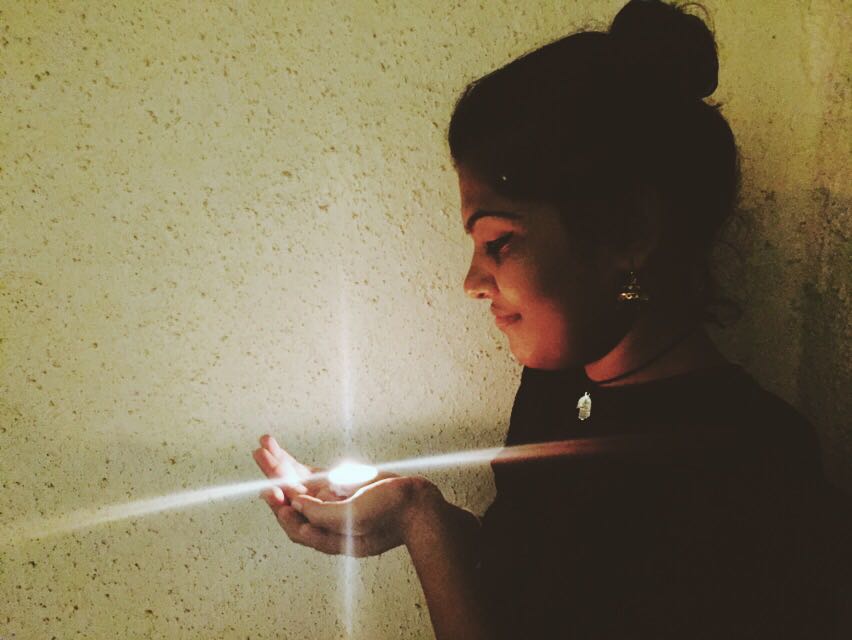
by Mubaraka MotiwalaAge: 18Country: India (This essay was first published on the Safe City blog on January 22, 2017) Female genital mutilation (FGM), also known as female genital cutting and female circumcision, is the ritual removal of some or all of the external female genitalia. Ever wondered why it’s done? Well I did and I found out what a heinous act it truly is. In the summer of 2016, I went for a vacation and discovered that I too was a victim of FGM. This came as a complete shock to me; like a repressed memory it just zapped my brain and froze my memory. I was in the bus having a conversation with one of my Muslim female friends and in the midst of talking about religion she suddenly asked me if I was circumcised? At first I was confused and gave it a good thought but nothing came to me, so I said, “no, that wouldn’t have ever happened to me’’. Saying this, we continued with our conversation. A month later a few people in my community started talking about it and I had a few college classmates come up to me asking me to be a part of the FGM movement or if I’ve experienced it. This led me to really think about this and finally when I was travelling back home one day the memory came rushing in and completely baffled me. I am in fact a victim of this preposterous act and was so utterly unaware and uneducated about it. I was tricked into thinking that I’ll be getting chocolate and instead was taken to a shady-looking dimly lit house, where a lady was waiting for me and my grandmother. The lady asked me to lie down and spread my legs, which was an extremely strange thing for me to do. But my consent and opinion wasn’t taken into account, of course. She pulled my panties down and told me to stay still and that I won’t be hurt at all while my grandmother sat there, watching. And then it happened, she cut my clit and put some antiseptic but that didn’t stop me from crying out in pain and have a bruised vagina. Finally, I was given the promised chocolate and taken back home to forget and mask the day’s event completely. So my question is, why do we perform this practice? Through my research I’ve found out that FGM is practiced by people because it is often considered necessary for raising a girl, and to prepare her for adulthood and marriage. It is often motivated by beliefs that it is imperative to perform this. It aims to ensure premarital virginity and marital fidelity and in many communities believed to reduce a woman’s libido and therefore believed to help her resist extramarital sexual acts so she can be loyal to her husband. FGM is carried out because it is believed that being cut increases marriageability and is associated with cultural ideals of femininity and modesty, which include the notion that girls are clean and beautiful after removal of body parts. Known as Khatna in certain communities, it is considered as a prestigious event and often celebrated and boosted by family members and society. But in reality I think this practice is performed in attempts to control women’s sexuality and ideas about purity, modesty and beauty. The reason behind all kinds of genital mutilation is to restrict female sexual experience. It is usually initiated and carried out by women itself who see it as a source of honour, and who fear that failing to have their daughters and granddaughters cut will expose the girls to social exclusion and generate rebellious nature. And to my complete utter surprise no religious scripts prescribe the practice. Practitioners often believe the practice has religious support and is good for female health but there are no known health benefits. So the truth is that nobody knows why we practice FGM but because it is imposed on us as a religious responsibility and as our ticket to be accepted and be married, we go along with it. Everybody has been lying to us telling us that this is the right thing to do and beneficial for our future. This entire malpractice is existent to ensure and preserve patriarchy in societies. Us women are always controlled by someone or something for our entire life. This kind of behavior makes us give in and accept the stereotypes that are actually abusive and violating to us. We are manipulated into submission and are to do what someone else commands us. Aren’t we all the creation of god and told that he gives us everything for a reason, then why take away our will and consent to decide if we want this to happen to us or not. What gives anybody the right to take away the will to have their own opinion and purloin a part of someone’s body parts. What gives another person the right to enforce such unacceptable and abysmal rituals! We need to stand up for ourselves, ladies, and show people that we’re not empty vessels and we can’t be controlled to do whatever another pleases. We are human too. Say no to Female Genital Mutilation.
“You have no right over your body.” Things khatna supporters have told me
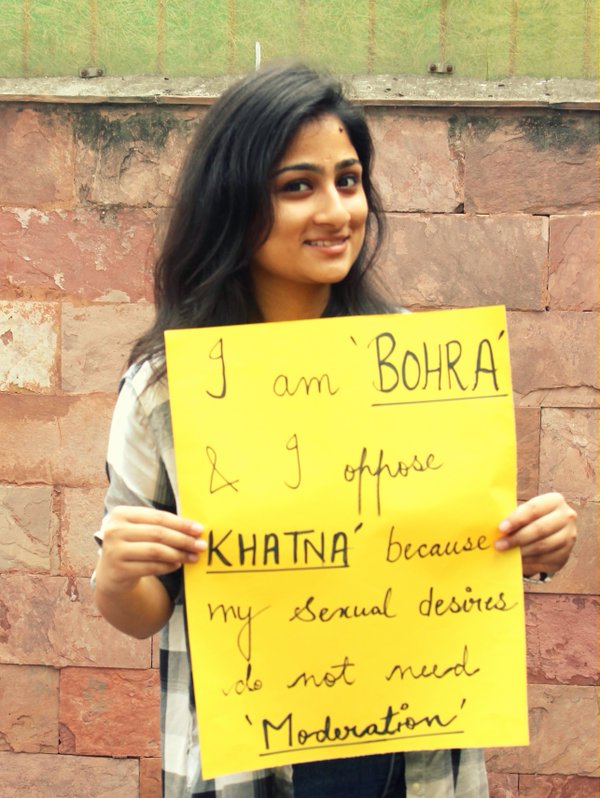
By: Saleha Paatwala Age: 23 Country: India After watching ‘Reflecting Her’ (a film on FGC) that gave me strength to fight, it has now been six months since I set out on this mission to end the hazardous practice of Khatna. In these months, I have had discussions with numerous individuals including my relatives, some of whom have been against the practice and some of whom have been in support of it. From my discussions, I have learned why some individuals support this practice and continue following it. At first, I was extremely apprehensive to begin discussing this topic in my family group, but I knew that I had to. After my conversation with them, I realized my own relatives were living with misguided knowledge on the topic. Below are a few reasons given by individuals who support the practice. I have also included my answers to their reasons: Cousin – It is Rasullah’s sunnah (the Prophet’s preaching for the benefit of people, not a compulsion) which has been taken after.My response – If Khatna is Sunnah, why has it been made obligatory on all ladies, then? Friend – It is Allah who has made us and as a dedication to him, we should give him something.My response – If he has made us, why does he need us to give something back to him? Also, if he truly needs some kind of devotion from us, why not cut a hand or a leg and give him, may b Grandmother – Women get to be devout and clean.My response – Why would Allah send us to earth impious and impure? So are those who haven’t experienced this practice corrupt and debase? Cousin – If not done on time, she may become promiscuous and destroy her life.My response – How does a piece of her body lead her to promiscuity? Doesn’t that depend on her upbringing and not her clitoris? Cousin – You have no right over your body.My response – Yes, according to ‘you’, women have no privilege to explore her sexuality. People can touch her without her consent & cut any part of her because she has no right on her own body. Cousin– If she has undergone this practice, she will be faithful to her husband.My response – Are women born just to keep her better half fulfilled, to make due in this patriarchal society? One comment which was made by a relative still echoes in my ears. “I will soon give birth to a girl, make her undergo khatna before you, and you won’t be able to stop me from doing it”. In the twenty-first century, where ideas are developing rapidly, holding on to such patriarchal thinking is pointless. I was stunned to hear one of my friend’s thoughts on this issue. He said, “It’s good to make Allah happy by giving him something”. Many people consider it a religious practice. They think it is written in the holy book, the ‘Quran’. But when I ask them to show me where it is written, they provide me no answer. Many of those who I asked, told me not to go further into this issue as it will lead to my alienation. According to them, I am squandering my time trying to end this practice. Yet I know that it is imperative to understand the outcomes of this practice when it is considered to be a part of your religion and when it is done on young girls who have no clue why it is being performed on them. It maddens me to imagine that we were sliced just to control our sexuality. Why not permit ladies to live as they are and explore their sexuality without putting confinements on them. A little seven-year-old girl, who doesn’t yet understand what sexuality is, is taken through this insidious practice which later gives her the feeling of betrayal by her own family members. This cruelty is so important that if she hasn’t got cut in her younger age, she gets asked by her in-laws at the time of marriage to undergo it so that she becomes pious, before the marriage. Many women still can’t speak out against this practice even if they want to do so because patriarchal traditions still consider women as servants of her in-laws and her husband. From the Twitter debate in July, organized by Sahiyo, numerous arguments came forward that supported Khatna. One such lady said, “I had experienced it and I don’t considerably recall the agony. It was managed without harming me and I have no unforgiving memory of it”. She continued, “I also gave consent to my parents to have my ears pierced & it didn’t harm too”. I have heard many arguments comparing khatna to ear or nose piercing. While ear piercing doesn’t remove any skin, FGC in the Bohra community includes partial or complete removal of the clitoral hood. If I didn’t have the support of my folks, it would have been difficult to speak out against this practice. My mom, who couldn’t stop her mother from taking her and us to have this practice performed, now strictly condemns this act and wants me to fight FGC until it ends. Khatna was considered a secretive act and so I never spoke about it to anyone, not even with my sisters. After gathering more courage, I spoke about it to my father and he said “yes, I knew about this act. Your grandmother was so stubborn that she didn’t listen to me at all.” When my father tried to stop her, my grandmother told him, “Don’t you want your girl to be pious? Do you want her to become promiscuous?” He lost that argument which is what prompted my sisters to get circumcised as well. He also now wants me to speak out against the practice so that no other girl goes through such a practice which is neither religiously based nor has any health benefits.
Sahiyo at a unique Women’s Day event in Mumbai
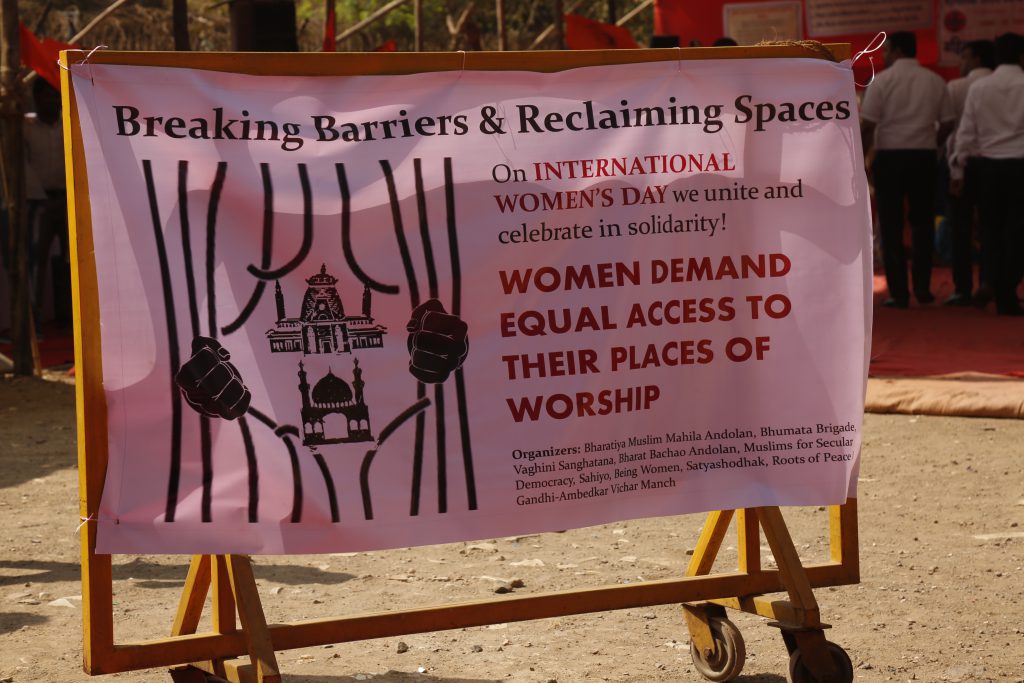
Sahiyo Participates in “Challenges to Minority Women’s Rights and Development in Maharashtra” Roundtable.
